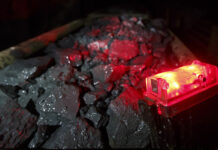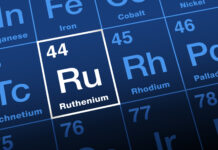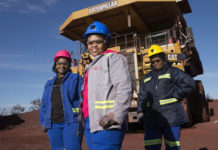
[miningmx] — COSATU and the National Union of Mineworkers (NUM’s) “reclamation’
of Rustenburg during a huge rally in Rustenburg last Saturday turned out to be a damp
squib, despite incurring all the cost and trouble of transporting workers in from all
over the country.
Even Sun City’s workforce was called in. When the first participants in the rally
arrived at the stadium in minibuses at about 9:30, they were met and confronted by
about 1,500 Anglo American Platinum (Amplats) strikers.
Soon after that, the rubber bullets started flying and a cloud of tear gas hung over
the stadium. Only at one o’clock, when the troublemakers had been dispersed, did
Cosatu general secretary Zwelinzima Vavi and the SA Communist Party’s shrill-voiced
firebrand, Blade Nzimande, address a subdued crowd of less than a thousand.
Cosatu is in a crisis in Rustenburg. Who would’ve thought it could convince only 1,000
supporters to turn up at a rally.
NUM general secretary Frans Baleni delivered a historical, but unimpressive speech
filled with empty phrases. It was historical because it was his first speech in the
platinum district of Rustenburg. Unfortunately there were no platinum mine workers
to hear it.
Vavi, on his part, delivered a fiery speech. It’s a testimonial to his character that he
is going to so much trouble to support Baleni and NUM. Less than two months ago,
Baleni was heading a group of Cosatu trade union leaders who were loudly spreading
gossip to dump Vavi as the secretary general of Cosatu at the trade union federation’s
September conference.
NUM announced on Friday evening it had reached “a settlement’ with Amplats to end
the strike that had halted operations at Amplats’ mines for six weeks.
Each striker will receive R2,000 “emergency cash’ as well as a R2,500 loan, repaid
over six month Those who did come to work will get a small bonus of R2,000 to thank
them for their loyalty.
But there’s no change in the conditions of service and the ordinary wages. And the
cash payments were subject to everyone going to work on Tuesday morning.
The events at Olympia Park were an indication of what the workforce thinks of the
offer. Just to make sure there was no doubt, they set fire to a substation at one of
Amplats’ shafts on Thursday morning. Production was out of the question.
The spectacular collapse of the “recapture’ of Rustenburg confirms a suspicion that
has grown stronger in recent weeks: NUM’s days in the North-West platinum belt are
numbered. It takes time to end trade union recognition agreements, but it will be no
surprise if NUM is no longer the majority union at any of the platinum mines in
Rustenburg in a year or so.
At Impala Platinum the wheels are turning; at Lonmin it’s just a question of time; and
Amplats’ workers showed their true colours on Saturday.
This is something we take no delight in. Despite what many people think, it is a
blessing that South Africa has a workforce which – compared with those of other
developing countries – is highly organised into trade unions. This makes real
communication with the workforce possible, but not a matter of course, as we have
now seen.
Cosatu’s executive committee will hold its last meeting in November. It would have
been dominated by President Jacob Zuma’s re-election as leader of the ANC in
Mangaung. Something makes one think Zuma will be less important this time.
There are people who have been thinking deeply about the consequences of the
events of the past two months at mines – including the CEOs of (some) mining
companies. By this time, everyone will have realised that Amcu is not really the root
problem – instead, it’s the gap that has developed between NUM’s members at
grassroots level – the working poor – and its lower- and middle-level leadership
structures.
As explained in an earlier column, NUM union stewards – the first line of
communication with and service to ordinary members – nowadays come from higher
job levels. The needs of A-band workers, mostly illiterate migrant labourers, have
become increasingly less important for these trade union stewards.
There is also good reason to believe that NUM is not the only union struggling with
this problem.
Union stewards have become an elite group who drive around in company vehicles,
work in air-conditioned offices (there are air-conditioning underground too, but it’s not
quite the same), live in mine houses and wear shop-bought clothes.
And what do they do?
Some company CEOs, who have lately analysed these problems with more than the
usual amount of concentration, have come to a startling conclusion: we have
relegated our human resources management duties to a large extent to NUM.
Some of the decisions left to union stewards are pure management issues. That’s part
of the reason why the union’s members are rejecting it. Human resources
management is crucial in most organisations, but especially in labour-intensive
mines. Company managements will have to reclaim this role.
NUM is a large and experienced union with lots of resources at its disposal. It may
regain its position one day, but it’s embroiled in a battle for the hearts and minds of
its members. It will not achieve this by trying to “recapture’ Rustenburg with fiery
speeches.
It will only achieve this by admitting humbly to its members that it has let them
down and then does everything in its power to rectify the situation.











